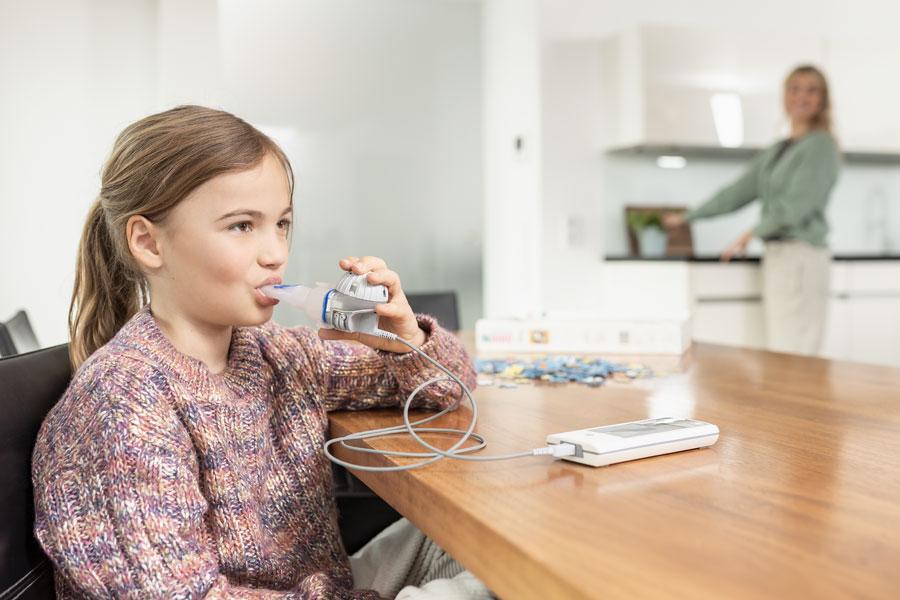Cystic fibrosis (CF) is a serious lifelong illness you are born with. It affects your lungs and digestive system by causing thick mucus buildup. There is no cystic fibrosis cure yet, but cystic fibrosis treatments (CF treatments) in the UK have improved greatly. This means people with CF are living longer lives. Working closely with your CF care team at the hospital or specialist centre is crucial in creating the best CF treatment plan for you.
Cystic fibrosis is caused by a mutation in the gene called the cystic fibrosis transmembrane conductance regulator (CFTR) gene. Sometimes it is called the cystic fibrosis gene. The regulator is a protein that sits on the surface of cells in many organs.
Imagine this protein as a channel that helps move salt and water in and out of your cells. With cystic fibrosis this channel function does not work. Water and salt cannot flow in and out of the cell. The mucus covering the cells contains too little water and therefore becomes thick. The thick mucus clogs up organs in your body, especially your lungs and pancreas. This mucus buildup can lead to infections, inflammation, and lung damage.

Symptoms of cystic fibrosis can vary from person to person, but they can affect any organ that has the CFTR protein. The most common problems are with the lungs and digestive system.
People with CF often cough a lot to clear out thick mucus from their lungs. This mucus can make it hard to breathe and lead to frequent infections.
The thick mucus can also block the pancreas, an organ that helps with digestion. This can cause stomach pain, constipation, and trouble gaining weight, especially in babies and young children.
Because of the gene problem, people with CF lose more salt in their sweat. This is why it's important to make sure they get enough electrolytes, which are minerals your body needs to function properly.
In the past, people with CF didn't live very long but thanks to early diagnosis, better treatments, and ongoing research, the outlook is now much brighter 1. The predicted lifespan for people with CF in the UK is now over 56 years 2. Experts are hopeful that this number will keep going up.
There is no cure for CF yet, but treatments have improved. These treatments involve a team effort between the patient, parents (for children), doctors, physiotherapists, and other specialists. In addition to medications, management may include using a nebuliser with hypertonic saline solution, breathing exercises, special diets, and exercise.
Nebulisers are a mainstay for people with cystic fibrosis. Nebuliser machines turn medicine into a mist that you breathe in. The hypertonic saline mist generated helps loosen thick mucus in your lungs, making it easier to cough up and reducing your risk of infections 3. Getting rid of excess mucus can also make breathing easier.
Nebulisers can also deliver antibiotics directly to your lungs to fight off infections.
Using a nebuliser can involve several steps depending on your specific needs. It might include using medicine to open your airways (bronchodilators) first, followed by e.g. hypertonic saline to loosen mucus, and then antibiotics if you have an infection. Talk to your CF team to learn more about what to expect.

Physiotherapy is another important part of CF treatment. These are special exercises that help loosen mucus in your lungs and make it easier to breathe. There are also devices you can use to help with this, such as PEP systems. Doing physiotherapy along with nebuliser treatments is generally recommended.
CFTR modulators are newer medications that target the underlying cause of CF. These drugs help the faulty CFTR protein work better, allowing salt and water to move in and out of your cells more easily. There are different types of CFTR modulators, some that help to form the shape of the protein (correctors) and traffic to the cell membrane and others that boost its activity (potentiators). There are also next generation modulators that combine both effects.
Nebuliser treatment takes time in cystic fibrosis and therefore this question is often asked by patients. Experts agree that nebuliser therapy should usually continue even when taking CFTR modulators, especially if the patient is struggling with irreversible lung damage, frequent exacerbations and a chronic infection 4,5. This applies to the inhalation of hypertonic saline solution, but especially to the inhalation of antibiotics.
Cystic fibrosis is a serious lifelong illness, but there's a lot of hope for people with CF. Treatments have improved in recent years, and people with CF are living longer lives. There is no cure yet, but new medications are targeting the root cause of the disease. If you have CF, it's important to stick with your treatment plan to manage your symptoms and stay as healthy as possible.
Since 2003, all babies born in Scotland have been checked for cystic fibrosis (CF) shortly after birth. The rest of the UK followed suit in 2007. This check is a simple heel prick test.
There is a 1 in 4 chance that your baby will be born with CF if your partner is healthy. To find out you can have carrier testing.
In the UK there are specialist centres for CF care. The Cystic Fibrosis Trust has a website where you can find a center in your area.
The Cystic Fibrosis Trust website has a page with resources such as a helpline, travel information, financial support and many more.
The Cystic Fibrosis Trust provides leaflets produced with the help of dieticians from the UK. The Cystic Fibrosis Foundation also has a resource about nutrition for children with CF.
References
[1] Keogh H et al. J Cyst Fibros (2018); 17 (2) (https://www.ncbi.nlm.nih.gov/pmc/articles/PMC5885983/)
[2] https://www.cysticfibrosis.org.uk/sites/default/files/2023-12/CFT_2022_Annual_Data_Report_Dec2023.pdf
[3] https://www.cff.org/managing-cf/mucus-thinners, https://www.cysticfibrosis.org.uk/news/survival-statistics-what-if-im-already-30
[4] Elborn JS, Blasi F, Burgel P-R et al. Eur Respir Rev 2023; 32: 220154 (https://pubmed.ncbi.nlm.nih.gov/36631132/)
[5] Burgel PR et al. BMJ Open Respir Res. 2024 May 3;11 (https://pubmed.ncbi.nlm.nih.gov/38702073/)
Contact us
Any questions? You can reach us at this number:
01932 341122
© 2025 PARI GmbH Spezialisten für effektive Inhalation